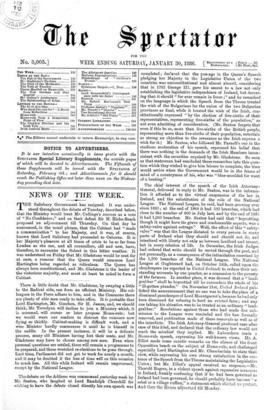The chief interest of the speech of the Irish Attorney-
General, delivered in reply to Mr. Sexton, was in the informa- tion it afforded as to the virtual suspension of the law in Ireland, and the substitution of the rule of the National League. The National League, he said, had been growing ever since 1883; at the end of 1884 it had 592 branches, which had risen to the number of 800 in July last, and by the end of 1885 it had 1,200 branches. Mr. Sexton had said that "boycotting, though it might have its grave and condemnable aspects, was a safety-valve against outrage." Well, the effect of this " safety- valve " was that the League dictated to every person in many parts of Ireland what they should and should not do, and interfered with liberty not only as between landlord and tenant, but in every relation of life. In December, the Irish Judges had ordered that writs should be served through the post, and not personally, as a consequence of the intimidation exercised by the 1,200 branches of the National League. The National League at Oughtemrd had, on October 24th, called upon the shopkeepers (as reported in United Ireland) to reduce their out- standing accounts by one quarter, as a concession to the poverty of the farmers. In another place, it was decreed that a " land- grabber " shall be boycotted till he surrenders the whole of his "ill-gotten plunder." On November 21st, United Ireland pub- lished the announcement that no one was to take the place of a dismissed gamekeeper of Lord Mountgarret's, because he had only been dismissed for refusing to herd an evicted farm ; and any one taking his situation was to be treated as an ordinary "land- grabber." Resolutions against those who had made due sub- mission to the League were rescinded and the ban formally removed, and publication made of these removals as well as of the interdicts. The Irish Attorney-General produced case after case of this kind, and declared that the ordinary law would not reach the mischief they implied. Mr. Labouchere made a Home-rule speech, expressing his well-known views. Mr. A. Elliot made some caustic remarks on the silence of the front Opposition bench on the subject of Home-rule, and challenged especially Lord Hartington and Mr. Chamberlain to state their view, while expressing his own strong satisfaction in the sen- tence of the Speech from the Throne maintaining the Legislative Union ; but Mr. Elliot's appeal received no response,—Mr. Thorold Rogers, in a violent speech against repressive measures in Ireland, frankly confessing that if he had been governed as Ireland had been governed, he should probably have become a rebel or a village tuflian," a statement which elicited v.e protest. And then the TiOase Ojourtied till Monday.


































